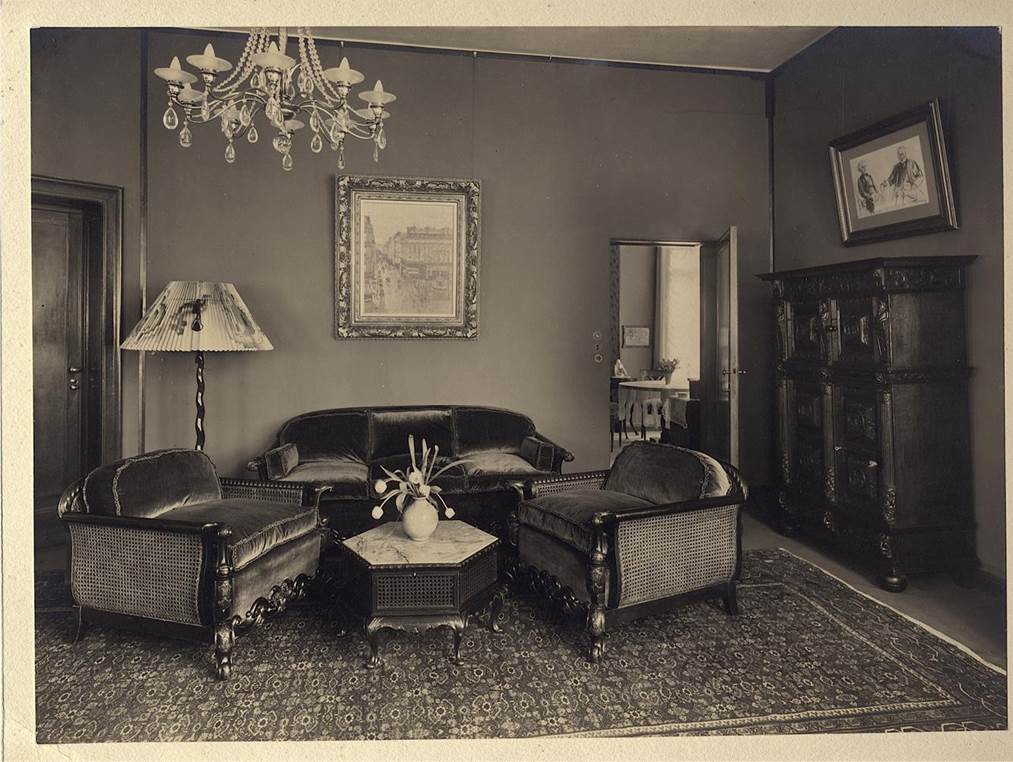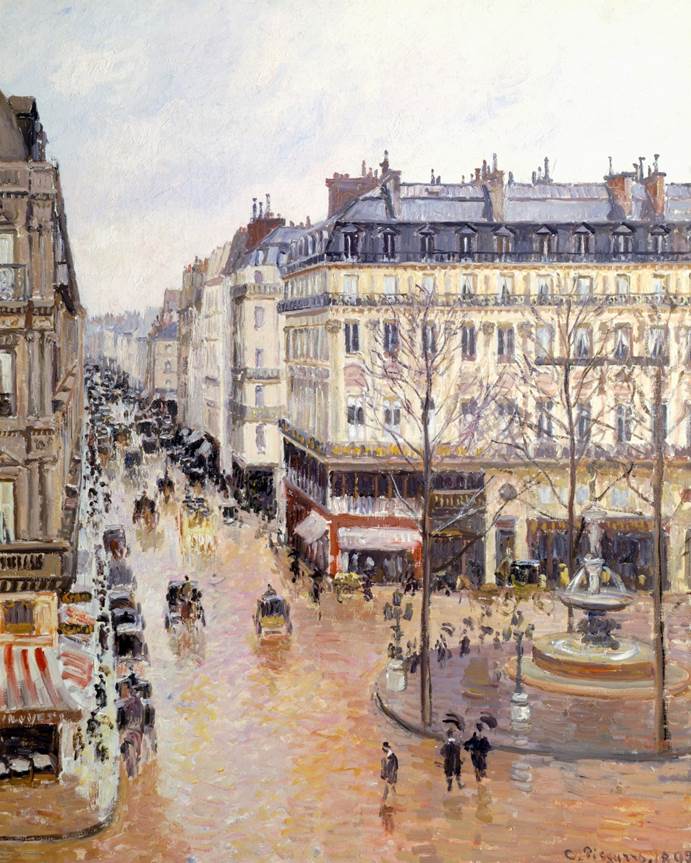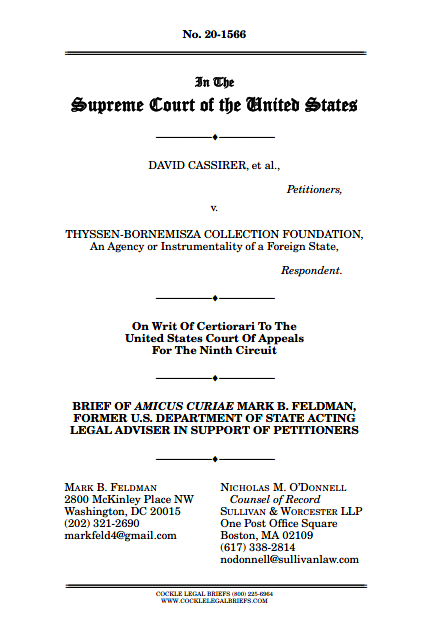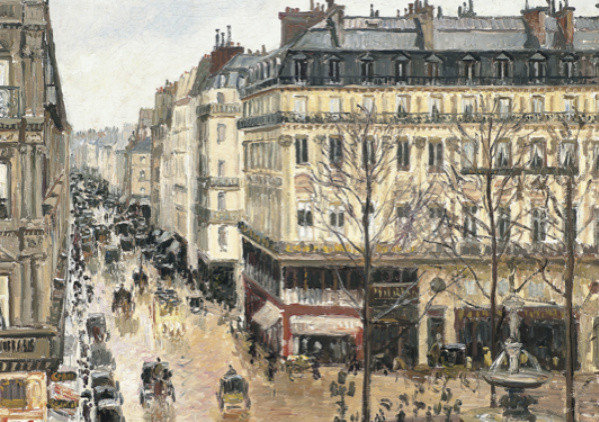
The U.S. Court of Appeals for the 9th Circuit ruled on January 9, 2024 that the Thyssen-Bornemisza Collection Foundation in Madrid is the owner of Rue Saint–Honoré, après-midi, effect de pluie (1892) by Camille Pissarro, a painting sold by German Jew Lilly Cassirer under Nazi duress. After the Cassirer family prevailed in the Supreme Court in 2023 that the 9th Circuit had previously applied the wrong legal test, the question before the 9th Circuit was the choice of which law to apply. In any case where the parties and subject matter are in different jurisdictions (or within overlapping jurisdictions like state and federal), a court must first decide which body of law to apply in analyzing a particular case. Here, the 9th Circuit ruled that Spanish law applied because Spanish law would be harmed more than California law if the other body of law applied (known as comparative impairment analysis). This, in turn, led to the holding that the Thyssen-Bornemisza Collection Foundation acquired good title after holding the painting for long enough that prior claims were extinguished.
The decision is thinly-reasoned. It looks to the “place of relevant conduct” as paramount to choosing applicable law, but concluded that the only relevant conduct was Spain’s purchase in 1993 of the Baron Hans Heinrich Thyssen-Bornemisza’s collection. Not the Baron’s Swiss residence, not his purchase of a stolen painting in New York (not located in Spain when last we checked) in 1976, not the earlier (New York) sale by Knoedler Gallery, nor the painting’s passage through California in the 1950s, nor the source of the defect in the first place: Nazi Germany. Rather, The court insultingly referred to Holocaust survivor and refugee Claude Cassirer’s life in California as a “fortuity.” As the late Justice Antonin Scalia might have said, “pure applesauce.”
The upshot is that a state (Spain, through the TBC) that did not acquire good title to a painting that was indisputably dispossessed by the Nazis will (barring further review) keep this ill-gotten property. Spain should have returned the painting the first time it was asked to do so. Digging its heels in over 18 years of litigation is a mockery of the commitments Spain made in the 1998 Washington Principles on Nazi-Confiscated Art. Nothing about Spanish law is impaired by refusing to honor a transaction at the direction of the Nazis.
The family has vowed to fight on, and good for them. As I often tell people as an example to frame this issue and this case, the picture below is of the painting in Lilly’s home. Now imagine that this was your home, and the very worst person you knew came in and demanded it because he knew you had no power to resist. Would you give up?
Read More
Topics:
Lilly Cassirer,
Rue Saint-Honoré après-midi effet de pluie,
Claude Cassirer,
Foreign Sovereign Immunities Act,
California,
Washington Principles on Nazi-Confiscated Art,
Spain,
FSIA,
Camille Pissarro,
Ninth Circuit Court of Appeals,
Cassirer v. Thyssen-Bornemisza Collection,
Jakob Scheidwimmer,
Sydney Schoenberg,
Eugen Kampf,
Antonin Scalia,
Hans W. Lange,
Federal Republic of Germany v. Philipp,
Philipp v. Stiftung Preussischer Kulturbesitz,
Simon v. Republic of Hungary,
choice of law,
Baron Thyssen-Bornemisza
Today I am pleased to announce that I have filed a brief in the Supreme Court of the United States as counsel of record for amicus curiae Mark B. Feldman, former U.S. Department of State Acting Legal Adviser. We filed the brief in the case of Cassirer et al. v. Thyssen-Bornemisza Collection Foundation (“TBC”). Cassirer is the long-running dispute over title to Rue St. Honoré, après-midi, effet de pluie (Rue St. Honoré, Afternoon, Rain Effect) by Impressionist painter Camille Pissarro. The painting once belonged to Lilly Cassirer, a Jewish woman in Berlin in 1939, from whom Nazi agents “bought” the painting. The case before the Supreme Court is not about whether the painting was stolen—it is undisputed that it was. Rather, the Supreme Court will review the Ninth Circuit’s decision that Spanish law, not California law, should govern the ownership rights.
Read More
Topics:
Lilly Cassirer,
Foreign Sovereign Immunities Act,
Supreme Court,
SPK,
Stiftung Preussischer Kulturbesitz,
Hermann Goering,
FSIA,
expropriation exception”,
sovereign immunity,
UNESCO,
Rue St. Honoré,
Camille Pissarro,
Baron Hans-Heinrich Thyssen- Bornemisza,
Cassirer v. Thyssen-Bornemisza Collection,
Welfenschatz,
Jakob Scheidwimmer,
Philipp v. F.R.G.,
Mark B. Feldman

One of the longest-running court cases in the United States about art looted by the Nazis has been decided in favor of the current possessor, the Thyssen-Bornemisza Museum in Madrid, an instrumentality of the Kingdom of Spain. The U.S. District Court in Los Angeles ruled on April 30, 2019 against the heirs of Lilly Cassirer, a German Jew whom the Nazis targeted in 1939 for a forced sale of Rue Saint–Honoré, après-midi, effect de pluie (1892). The ruling is the second time that the museum has prevailed in the District Court as the owner of the painting under Spanish law, now on the grounds the museum did not know of the painting’s looting history when it acquired the work and that it held the work publicly for long enough to become its owner even though it had been stolen. The ruling, while favorable to the museum in this case, confirms important principles about the inability of successive possessors to acquire good title to artworks stolen by the Nazis, and the importance of diligence and pursuing questions raised by red flags in the chain of title. Notable as well was the Court’s pointed criticism of Spain for failing to adhere to the spirit of the Washington Principles on Nazi-Confiscated Art, and Spain’s failure to “comply with its moral commitments.”
Read More
Topics:
Walter Feilchenfeldt,
Third Reich,
Terezin Declaration,
Gestapo,
Lilly Cassirer,
Claude Cassirer,
Jacques Goudstikker,
Nazi-looted art,
Czechoslovakia,
Spain,
Washington Principles,
Baron Hans-Heinrich Thyssen- Bornemisza,
A Tragic Fate,
Law and Ethics in the Battle Over Nazi-Looted Art,
Reichskammer der bildenden Künste,
flight taxes,
Rue Saint–Honoré,
Julius Cassirer,
Paul Durand-Ruel,
Ludwigstrasse,
Dr. Cassirer and Co. Kabelwerke,
Jakob Scheidwimmer,
Sydney Schoenberg,
Hahn Gallery,
Thyssen-Bornemisza Museum,
Military Government Law No. 59,
Reich Chamber of the Visual Arts,
Ari Walter Kampf,
Eugen Kampf,
Knoedler & Co. Gallery,
encubridor
The Norton Simon Museum in Pasadena’s efforts to bring an end to the claim by Marei von Saher to Lucas Cranach the Elder’s Adam and Eve failed yesterday, as the United States Supreme Court declined to hear the museum’s appeal from the decision last year by the Ninth Circuit Court of Appeals that restored the claims. The Supreme Court denied what is called a writ of certiorari, which is a discretionary appeal from a lower court. The high Court can accept cases on appeal from final judgments (as would be the case had the museum prevailed) or, as here, what are called interlocutory appeals—appeals of matters still in process. The Ninth Circuit decision revived Von Saher’s case and sent them back to the District Court for litigation, and the Norton Simon’s petition asked the Supreme Court to intervene and put an end to it. The overwhelming proportion of certiorari petitions are denied, interlocutory appeals even more so (courts favor hearing appeals of final judgments to avoid piecemeal adjudications). This is the second certiorari petition in the case: in 2011, Von Saher was on the losing end of a petition when her case had been dismissed under an earlier version of California’s statute of limitations.
Read More
Topics:
Legislation,
Dutch Secretary for Education Culture and Science,
Norton Simon Museum,
Alois Miedl,
Lilly Cassirer,
Norton Simon Art Foundation,
Rue Saint-Honoré après-midi effet de pluie,
Jacques Goudstikker,
George Stroganoff-Scherbatoff,
Hermann Goring,
Restitution,
Marei Von Saher,
Jr.,
World War II,
act of state doctrine,
Cassirer v. Kingdom of Spain,
Lucas Cranach the Elder,
Camille Pissarro,
Soviet Union,
foreign affairs doctrine,
California Section 354.3 of Code of Civil Procedur,
Von Saher v. Norton Simon Museum of Art
I am quoted at length in an article about the recent Von Saher decision: "Fight Over Paintings Looted by Nazis May Finally Get Trial Thanks to 9th Cir." by Nicholas Datlowe, published by Bloomberg BNA’s United States Law Week. The article covers the overall background and importance of the decision, and has quotes from the plaintiffs’ attorneys who now can return to the trial court to try to press their claim (and respond to the likely forthcoming act of state defenses, as discussed here previously). It also analyzes the dissent in the June 6, 2014 opinion by Judge Kim McLane Wardlaw, who would have upheld the trial court dismissal under the foreign affairs doctrine. 
Read More
Topics:
Bloomberg BNA,
82 U.S.L.W. 1944,
Dutch Secretary for Education Culture and Science,
Norton Simon Museum,
Alois Miedl,
Lilly Cassirer,
Norton Simon Art Foundation,
Rue Saint-Honoré après-midi effet de pluie,
Jacques Goudstikker,
Howard N. Spiegler,
Fred Anthony Rowley,
George Stroganoff-Scherbatoff,
Hermann Goring,
Harry Pregerson,
Restitution,
Marei Von Saher,
Jr.,
World War II,
act of state doctrine,
Cassirer v. Kingdom of Spain,
United States Law Week,
Lucas Cranach the Elder,
Camille Pissarro,
Dorothy Wright Nelson,
http://www.bna.com.,
The Bureau of National Affairs Inc.,
Kim McLane Wardlaw,
Soviet Union,
foreign affairs doctrine,
California Section 354.3 of Code of Civil Procedur,
Von Saher v. Norton Simon Museum of Art
The U.S. Court of Appeals for the Ninth Circuit restored on June 6, 2014 the claims by Marei von Saher against the Norton Simon Museum in Pasadena for the paintings Adam and Eve by Lucas Cranach the Elder. The appeals court followed its decision in Cassirer v. Kingdom of Spain in December of last year, concerning the painting Rue Saint-Honoré, après-midi, effet de pluie by Camille Pissarro that was owned at one time by Lilly Cassirer, a Jewish collector who fled Germany in 1939. While the panel of judges vacated the Von Saher dismissal that was premised on the idea that California’s revised statute of limitations was unconstitutional (instead finding that the law and claims withstand that scrutiny), the divided 2-1 panel sent the case back to the district court to determine if the claims were nonetheless barred under the “act of state doctrine”. One dissenting judge would have upheld the dismissal on the grounds that the case would call into question Von Saher’s compensation from the Dutch government such that that would violate the foreign affairs doctrine. That split on the act of state doctrine partially answers the lingering question of why Von Saher, argued the same day as Cassirer concerning the same California law, had gone undecided six months after Cassirer was resolved.
Read More
Topics:
Dutch Secretary for Education Culture and Science,
Norton Simon Museum,
Alois Miedl,
Lilly Cassirer,
Norton Simon Art Foundation,
Rue Saint-Honoré après-midi effet de pluie,
Jacques Goudstikker,
Howard N. Spiegler,
Fred Anthony Rowley,
George Stroganoff-Scherbatoff,
Hermann Goring,
Harry Pregerson,
Restitution,
Marei Von Saher,
Jr.,
World War II,
Foreign Sovereign Immunities,
act of state doctrine,
Cassirer v. Kingdom of Spain,
Lucas Cranach the Elder,
Camille Pissarro,
Dorothy Wright Nelson,
http://www.bna.com.,
Kim McLane Wardlaw,
Soviet Union,
foreign affairs doctrine,
California Section 354.3 of Code of Civil Procedur,
Von Saher v. Norton Simon Museum of Art
The U.S. Court of Appeals for the 9th Circuit restored last week claims by heirs of Lilly Cassirer against the Thyssen-Bornemisza Collection for the return of the Camille Pissarro painting Rue St. Honoré, après-midi, êffet de pluie.
Read More
Topics:
Nuremberg laws,
Schwabinger Kunstfund,
Cornelius Gurlitt,
Lilly Cassirer,
California Code of Civil Procedure § 338(c),
Dorothy Nelson,
Thyssen-Bornemisza Collection,
Julius Schoeps,
Rue St. Honoré après-midi êffet de pluie,
Claude Cassirer,
Von Saher v. Norton Simon,
de Csepel,
Jacques Goudstikker,
California Code of Civil Procedure § 354.3,
Gurlitt Collection,
Foreign Sovereign Immunities Act,
Hans Sachs,
Von Saher v. Norton Simon Museum of Art at Pasaden,
Madame Soler,
Bundesgerichtshof,
Hildebrand Gurlit,
Entartete Kunst,
Hans-Heinrich Thyssen-Bornemisza,
Hungarian National Gallery,
Nazis,
Munich,
Deutches Historisches Museum,
FSIA,
Preemption,
Gurlitt,
Harry Pregerson,
Restitution,
field preemption,
Marei Von Saher,
Herzog collection,
Bavaria,
Claudia Seger-Thomschitz,
Looted Art,
World War II,
Foreign Sovereign Immunities,
Pinakothek der Moderne,
degenerate art,
Altmann v. Republic of Austria,
578 F.3d 1016,
Freistaat Bayern,
beschlagnahmte Kunst,
Camille Pissarro,
Kim McLane Wardlaw,
Nürnberger Gesetze,
Raubkunst,
Museum of Fine Arts Boston,
Cassirer v. Thyssen-Bornemisza Collection,
verschollene Kunst,
Kunstfund München
The U.S. Court of Appeals for the Ninth Circuit heard oral argument last week in two high-profile World War II art restitution claims, Von Saher v. Norton Simon Museum of Art, and Cassirer v. Kingdom of Spain. The Supreme Court’s previous decision not to hear earlier appeals of those cases with regard to statutes of limitations has had a broad effect for years now, and last year's dismissal was widely observed. At its core, the Von Saher case poses a direct question: is a claim that alleges procedural unfairness with the restitution claims process in another country after World War II (i.e., the Netherlands) so wrapped up in the State Department’s foreign policy apparatus that courts cannot intervene (requiring dismissal at the outset of the case), or is that fairness a question of fact that entitles the plaintiff to survive the threshold analysis and proceed to discovery or a trial? Although comments from the bench are never a predictor of the results, the spirited argument underscored the importance of the two cases to the future of restitution claims in federal courts, and whether the restitution question is incompatible with the separation of powers in the U.S. government.
Read More
Topics:
Dutch Secretary for Education Culture and Science,
Norton Simon Museum,
Alois Miedl,
Lilly Cassirer,
Norton Simon Art Foundation,
Rue Saint-Honoré après-midi effet de pluie,
Jacques Goudstikker,
Howard N. Spiegler,
Fred Anthony Rowley,
George Stroganoff-Scherbatoff,
Hermann Goring,
Harry Pregerson,
Marei Von Saher,
Jr.,
Cassirer v. Kingdom of Spain,
Lucas Cranach the Elder,
Camille Pissarro,
Dorothy Wright Nelson,
Kim McLane Wardlaw,
Soviet Union,
California Section 354.3 of Code of Civil Procedur,
Von Saher v. Norton Simon Museum of Art
An emerging new defense to wartime art restitution claims has claimed another case. Although still confined to one district in California, the trend of dismissing such claims as better suited to resolution through the foreign affairs operations of the federal government simply cannot be ignored; wartime claims already struggling to overcome statutes of limitations could be in real trouble. The procedural history is complex, but the effect could be sweeping.
Read More
Topics:
Legislation,
Nazi Germany,
Lilly Cassirer,
Rue Saint-Honoré après-midi effet de pluie,
California Code of Civil Procedure Section 338,
conflict preemption,
FSIA,
Preemption,
Restitution,
field preemption,
Goudstikker,
World War II,
Foreign Sovereign Immunities,
Von Saher v. Norton Simon Museum,
Cassirer v. Kingdom of Spain,
California Code of Civil Procedure 354.3







